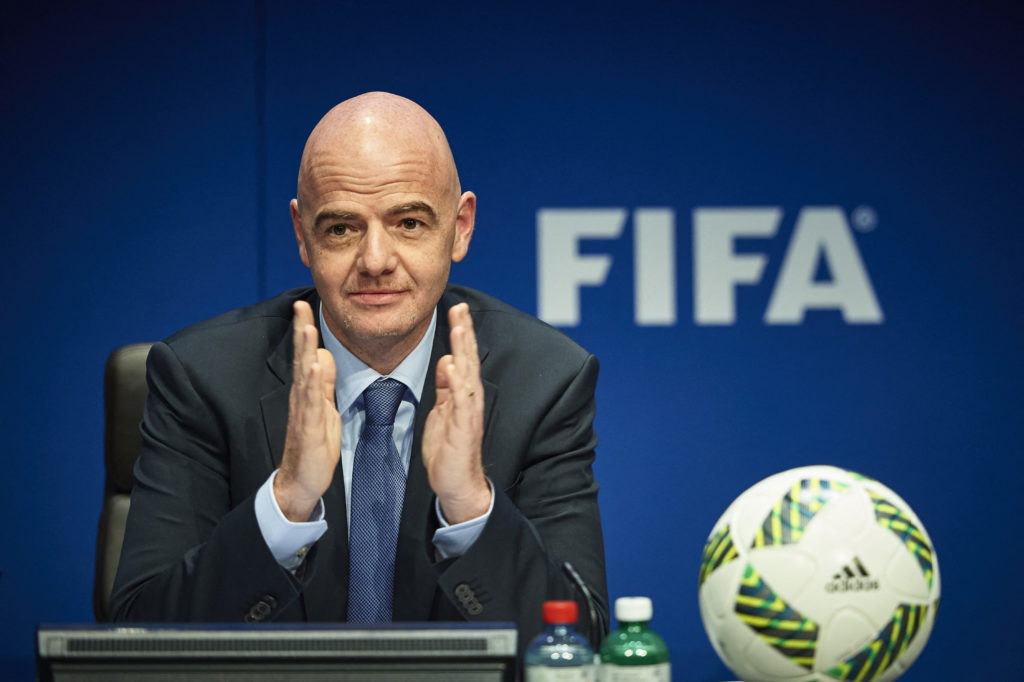In a striking speech on the day before the 2022 World Cup kicks off, FIFA president Gianni Infantino accused Western critics of "pure hypocrisy" and "double standards" in their reporting and attitudes about Qatar's very dubious human rights record.
In a nearly hour-long monologue on Saturday, Infantino lashed out in defence of Qatar and the football tournament, which has in recent weeks and months been overshadowed by the country's treatment of migrant workers, women and minorities such as the LGBTQ community.
"Today I feel Qatari. Today I feel Arabic. Today I feel African. Today I feel gay. Today I feel disabled. Today I feel [like] a migrant worker," he began the speech. "Of course, I am not Qatari, I am not an Arab, I am not African, I am not gay, I am not disabled."
However, he seemingly implied that, as the son of Italian immigrants in Switzerland, he understood the experiences of these people and other minorities in Qatar. "I know what it means to be discriminated [against], to be bullied as a foreigner in a foreign country. As a child, I was bullied – because I had red hair and freckles, plus I was Italian, so imagine.”
Europe in no position 'to give moral lessons'
Infantino glossed over concerns about whether LGBTQ fans were in danger in Qatar – where (openly) gay people risk torture and imprisonment – and insisted that the country had reformed workers' rights "beyond all recognition," with FIFA's help.
According to him, FIFA received assurances from the Qatari authorities that "everyone" would be "welcome" during the World Cup. "If someone says the opposite, that is not the opinion of the country and certainly not the opinion of FIFA."
Infantino also stated that western nations were in no position to give any morality lessons given their past and current behaviour. "We have been told many, many lessons from some Europeans and the western world. I think, for what we Europeans have been doing the last 3,000 years, we should be apologising for the next 3,000 years before starting to give moral lessons to people."
Last year, The Guardian reported that at least 6,500 migrant workers died in Qatar in the process of constructing venues for the event. For Infantino, however, these criticisms were "hypocritical" considering the fact that 25,000 migrants have died trying to get into Europe since 2014.
"Qatar is offering them this opportunity," he said. "They do it legally. In Europe, we close our borders. We practically do not allow any workers from these countries who are trying to come to work legally in our countries."
Addressing reports about Qatar having hired paid actors to play international football fans at the World Cup to generate excitement for the tournament, he accused journalists of racism. "Can someone who looks maybe like an Indian not cheer for England, or for Spain or Germany?” he asked. “You know what this is? This is racism. This is pure racism. And we can stop that.”
'Deflection and whataboutery'
Furthermore, Infantino wondered why no one is recognising the progress made in Qatar in recent years, since the World Cup was awarded to Qatar in 2010. "This one-sided moral lesson is just hypocrisy. It is not easy to take the critics of a decision that was made 12 years ago. Qatar is ready, it will be the best World Cup ever."
However, the speech immediately drew a lot of criticism from activists and human rights organisations. Nicholas McGeehan, director of FairSquare, told The Guardian that Infantino’s comments were "as crass as they were clumsy, and suggest that the Fifa president is getting his talking points directly from the Qatari authorities."
“Deflection and whataboutery have always been at the core of Qatar’s PR efforts to defend its rank failures, and now they have the FIFA president doing their work for them," he added.
Related News
- Alcohol sales to be banned at World Cup stadiums, FIFA confirms
- 'General lack of interest': Belgians indifferent about Qatar World Cup
- Qatar 2022: Dutch journalist arrested after taking photos of security guards
For Amnesty International, Infantino's brushing aside of legitimate human rights criticisms dismisses the enormous price paid by migrant workers to make his flagship tournament possible – as well as FIFA’s responsibility for it.
"Demands for equality, dignity and compensation cannot be treated as some sort of culture war – they are universal human rights that FIFA has committed to respect in its own statutes," said Amnesty's Head of Economic and Social Justice, Steve Cockburn.
"If there is one tiny glimmer of hope, it is that Infantino announced that FIFA would establish a legacy fund after the World Cup. This cannot be mere window dressing, however," he said. "If FIFA is to salvage anything from this tournament, it must announce that it will invest a significant part of the $6 billion the organisation will make from this tournament and make sure this fund is used to compensate workers and their families directly."

